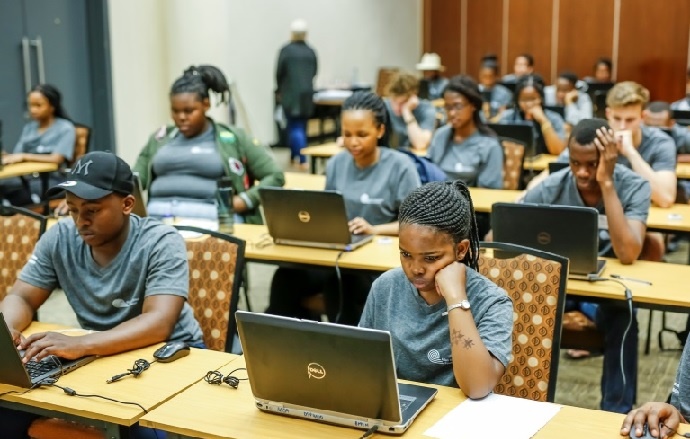
Building entrepreneurial mindset – how a person thinks, the lens through which they see the world, and how this influences their propensity for entrepreneurial activities and outcomes – requires a holistic approach that encompasses all key ecosystem participants: teachers, students and entrepreneurs.
Philanthropist Allan Gray and the Allan Gray Orbis group have created a value chain of initiatives, which make a sustainable, long-term contribution to Southern Africa by nurturing the emerging entrepreneurial potential, with a focus on three key areas of education, entrepreneurship and job creation
Also read: 5 things South Africa must get right for tech in schools to work
Making teachers experts
The Foundation believes that entrepreneurship can be taught, and runs several programmes to develop the skills needed by youth to start their entrepreneurial journey.
For author, entrepreneur and founder of the Entrepreneurial Learning Initiative Gary Schoeniger, entrepreneurship is an "opportunity discovery process", and to cultivate a generation of entrepreneurs, teachers need to be equipped to teach entrepreneurship.
"We’re teaching young people to think like employees instead of entrepreneurs, with a focus on delivery instead of discovery."
To aid teachers in creating the next generation of entrepreneurs in the classroom, the Jakes Gerwel Fellowship (JWF) was established. The JWF was born out of the Foundation’s realisation that teachers needed to be equipped to cultivate this talent in their classrooms and that there is a need to create high impact, expert teachers.
As expert teachers, Jakes Gerwel Fellows are encouraged to follow leadership and entrepreneurial paths within the teaching field so that in a collaborative manner, they are compelled to solving some of the biggest obstacles that currently characterise our education system.
Discovering new ways
According to research by the World Economic Forum, schools are generally well-enabled to develop foundational literacies; however, competencies such as creativity, critical thinking and collaboration that help students approach complex challenges as well as character qualities like curiosity, grit, social and cultural awareness that assist pupils navigate their changing environment are much harder to cultivate.
But for Schoeniger, teaching entrepreneurial skills is not complicated – he suggests allowing learners to work in small groups of three of four, and to have them identify problems in their community that they can solve.
Also see: Giving your children the very best chance at building successful lives
"When we use discovery-type learning, students develop creativity, critical thinking, communication, collaboration, resilience and resourcefulness."
Learning through discovery is at the heart the Foundation’s Entrepreneurship Challenge, a programme which gamifies entrepreneurship and introduces high school learners to entrepreneurial thinking and problem-solving. The Challenge empowers teachers with collateral and content that encourage real solutions to current problems, and runs as a national online competition that is fun and interactive. Over 8 500 learners have participated in the programme over a two-year period.
Walking the entrepreneurship road
Schoeniger believes children need to see examples of entrepreneurs from similar backgrounds, who are relatable role-models. This requires not only investing in learners, but ensuring they are given the lifelong support needed to make them successful entrepreneurs.
Through its Scholarship Programme, the Foundation offers high school scholarships to learners who are in financial need; have a curious, entrepreneurial mindset; and are high academic achievers. To date, 208 Scholars have graduated from the programme, who have produced more than 62 new businesses and 820 new jobs with a 0% unemployment rate amongst programme participants.
Also see: Here’s what teachers look for when kids start school
Schoeniger adds: “Not everyone should be a business owner, but everyone should be an entrepreneur. Entrepreneurship is identifying and solving problems in a resource strained and ambiguous environment.
All humans have the innate desire to be engaged in work that matters, to be able to solve problems, to see their work impacting people around them and to feel they are on a path towards something more prosperous for themselves.”
Chat back:
Share your story with us, and we could publish your letter. Anonymous contributions are welcome.
Read more:
- 10 tips to help you succeed at finding a job after matric
- Bursaries, scholarships & loans: Here's how to fund your studies
- 5 things South Africa must get right for tech in schools to work




 Publications
Publications
 Partners
Partners











